The Power of Author Community: 5 Hacks for New Indie Authors

“Surround yourself with talented people who will push you to work harder, engage your mind and stimulate your creativity.” – Lailah Gifty Akita, Author
From marketing to editing and beyond, independent authors face an array of complex decisions in getting their work out into the world. While the writing itself brings great pleasure and meaning, navigating the publishing landscape poses inevitable challenges. This is precisely why actively engaging with the power of an author community serves as a foundational, providing guidance, support, and opportunities that can significantly impact an author’s success.
You can find immense value in community engagement for indie authors. Surrounding yourself with a network of peers and mentors offers benefits that can seem elusive when tackling this career alone.
In this writer’s guide, we’ll focus on the power of an author community through networking, including where to connect with other authors and best practices for developing meaningful relationships. We will also take a closer look at writers’ groups and how to select and participate in ones that align with your needs and aspirations as a writer. From writer’s conferences to online forums, insight from seasoned authors to collaborations with peers, diving into the options for engagement and their potential impact will be an insightful first step.
Let’s dive in.
Community Engagement: A Guide for New Indie Authors
Independent publishing may seem as daunting as it is exciting. Amidst the hustle of writing, editing, and marketing, the importance of community engagement often fades into the background. Building and actively participating in a community serves as a cornerstone for surviving and thriving in the vast world of publishing.
The Power of Networking
Networking is more than a buzzword in the indie realm. It’s a lifeline. Engaging with other authors isn’t simply about exchanging pleasantries or following each other on social media. It’s about creating meaningful connections for support, advice, and opportunities.
These connections could lead to collaborative marketing efforts, such as cross-promotion with others in similar genres. Networking also means getting tips on the best cover designers, editors, or insights into other effective strategies. The independent publishing community is known for its willingness to help. Tapping into this resource can be a game-changer.
1. Finding Other Authors
- Social Media Platforms: Social media is an invaluable tool for making connections. Platforms like Twitter, Facebook, and Instagram have vibrant communities. LinkedIn is also a great place to connect with professional authors. Follow and engage with those you admire, join writers’ groups, and participate in writing challenges or hashtags like #WritingCommunity.
- Conferences and Workshops: Attending conferences, workshops, and seminars is an excellent way to meet authors. These events provide networking opportunities and offer valuable learning experiences. You could consider bringing your business cards and being ready to discuss your work.
- Online Forums and Communities: Websites like Goodreads, Reddit (in subreddits like r/writing or r/selfpublish), and dedicated forums are great places to meet other authors. These platforms allow for deeper discussions and connections over shared interests and challenges.
- Local Writers’ Groups and Book Clubs: Don’t overlook the power of local connections. Check out local writers’ groups, book clubs, or writing classes in your area. These are often found through community centers, libraries, or independent bookstores.
2. Connecting Best Practices
When networking as an indie author, embracing best practices in connecting significantly enhances your journey. Start by being genuine in your interactions. Authenticity in networking is crucial, as it fosters meaningful and lasting relationships. As you connect with others, consider what you might offer the relationship. Networking is a two-way street. By providing value through feedback, support, or resources, you establish yourself as a supportive and collaborative member of the community.
Follow up and maintain connections. After initial contact, keep the conversation going through social media, email, or subsequent meetings. This consistent engagement shows your commitment and interest. However, while reaching out is critical, respecting personal and professional boundaries is equally vital. Remember that not all authors may be open to networking or collaboration, and respecting their space is important.
In your networking journey, attend and participate in events regularly. This keeps you visible and up-to-date with the latest in independent publishing. Use online platforms effectively, engaging in meaningful conversations and appropriately using features like direct messages. Lastly, while many connections grow into friendships, maintaining a level of professionalism in all interactions is essential. This approach helps manage expectations. It also fosters a respectful and productive networking environment.
By adhering to these practices, you have the potential to build a robust network of other authors, creating a foundation of support and opportunity. This could potentially pivot your writing career. Effective networking is about building a community, not only a contact list.
Networking with other authors requires a blend of strategic engagement and genuine interactions. You’ll build a supportive network by participating actively in various communities, offering value, and maintaining professional relationships. This will contribute significantly to your growth and success as an indie. The goal of networking is to build a community, not merely a contact list.
3. Find Your Tribe in Writers’ Groups
Writers’ groups are the bedrock of the indie author community. They provide a platform for sharing work, receiving constructive feedback, and learning from others’ experiences. Whether online or in-person, they offer a sense of belonging and understanding, which might be hard to find elsewhere. Being part of one also means staying accountable. Regular meetings or check-ins can help maintain a consistent writing schedule. This might be crucial in keeping motivated and productive.
Writers groups and communities are essential for seeking support, feedback, and a sense of belonging in the indie publishing world.
Here’s an in-depth look at how to select and actively participate.
Understand Writing Groups and Communities
Writers groups and communities come in various forms, each with its own focus and dynamics. Some are genre-specific, catering to romance, sci-fi, or mystery writers, for instance, while others are more general. There are ones for different stages, from beginners to published authors. Communities exist online on platforms like Facebook, Reddit, or dedicated writing websites. They can also be in-person, often organized by libraries, bookstores, or community centeSs.
4. Select Relevant Groups
- Identify Your Needs and Goals: Assess what you want to gain before joining. Are you seeking feedback, accountability, networking, or learning opportunities? Your goals will guide you in choosing the right one.
- Research the Group’s Focus and Members: Look for one whose focus aligns with your interests or genre. Check out the members. Their level of experience, interests, and engagement should indicate if it’s right for you.
- Consider the Group’s Size and Structure: Smaller ones might offer more personalized feedback and a closer-knit community. While larger groups might provide a wider range of perspectives and networking opportunities. Also, understand the structure. Is it more formal with regular meetings and agendas or informal with a fluid approach?
- Trial Period: If possible, attend a few meetings or participate in online discussions before committing. This trial period helps you gauge whether the group’s dynamics and interaction style suit you.
5. Participate Actively
Active participation is the lifeblood of making the most out of writing groups and communities. It’s about being present and engaged. Start by regularly immersing yourself in the activities, whether attending meetings, contributing to online discussions, or participating in exercises. Consistent involvement keeps you connected and shows your commitment to the group and your growth as a writer. When giving and receiving feedback, approach it with an open mind. Providing thoughtful, constructive feedback is as vital as being receptive to the critiques you receive. This exchange of ideas and perspectives is crucial to honing your craft and enhancing your work.
Embracing diverse opinions and styles enriches the experience.
It offers a range of viewpoints and approaches to challenge and inspire you. Don’t hesitate to take on various roles. If you lead discussions, organize events, or moderate online forums, you deepen your involvement. It gives you a sense of ownership in the community. It also helps develop your leadership and organizational skills, which are invaluable as you progress in your career.
Another way to participate.
By sharing resources and opportunities with your group, your contributions will significantly benefit other members. Whether it’s information about upcoming writing contests, publishing platforms, or helpful writing tools, this generosity fosters a supportive and resource-rich environment for everyone. Lastly, applying what you learn to your writing is important. This shows that you value the other’s input, and it encourages a culture of continuous learning and improvement. By engaging actively, you become an integral part of a thriving, collaborative community supporting each member’s journey toward becoming a better writer.
My Struggle Navigating the Publishing World
Once, as an emerging indie author, I found myself struggling to navigate the complex world of publishing. My stories were close to my heart, but the challenge of getting them into readers’ hands felt insurmountable. That’s when I stumbled upon a local writers’ group meeting at a quaint coffee shop downtown every Thursday evening. Hesitant yet hopeful, I decided to attend.
At first, I was a mere observer, listening intently as more seasoned authors shared their experiences, challenges, and triumphs. I was drawn to Jordan, whose work in historical fiction had garnered some local acclaim. After a few meetings, I mustered the courage to approach her for advice on a manuscript I was working on. To my surprise, Jordan was willing to help and suggested we collaborate on a short story for an upcoming anthology.
This collaboration was the turning point. Working with Jordan, I learned the nuances of character development, plot pacing, and, importantly, the art of editing. Our combined efforts resulted in a richer and more compelling story than anything I had written alone. My confidence as a writer soared.
But the revelation came from the broader network I became a part of. Through Jordan, I was introduced to other authors and industry professionals. We exchanged marketing strategies and promotional ideas. This network, once a distant dream, became my support system, offering guidance, inspiration, and opportunities for growth.
When I look back, I realize that stepping into that writers’ group was more than a foray into socializing with peers. It was an entry point into a collaborative community that transformed my solitary journey into a shared adventure filled with learning, growth, and unexpected friendships. It taught me how your story may be your own, but the journey doesn’t have to be a solitary one.
Author Community—Final Pass
Writers groups and communities offer invaluable platforms for growth, support, and inspiration. If you select the right one and participate actively, you significantly enhance your writing journey. Remember, the goal is a balance between what you take from the community and what you contribute to it. The balance creates a nurturing and enriching environment for all members.
As you stand at the threshold of engaging with your author community, remember that this is the beginning of an enriching journey. The tapestry of relationships, insights, and opportunities you weave today will embellish the story of your writing career. The community you build is a supportive backdrop and a dynamic stage where your creativity, learning, and growth are performed and applauded. It’s a realm where each interaction is a thread in the larger narrative of your success, where every shared challenge is a chance for collective triumph, and where the symphony of diverse voices enriches your own.
The indie author community is renowned for its spirit of generosity, where established writers lift up emerging voices, where advice is shared freely between peers, and where everyone has something to contribute. By tapping into this rich network through the strategies we have covered and the ones still to come, you amplify your voice while adding to the chorus of others.
Understanding how to leverage these connections for mutual growth and support will further equip you to thrive on your publishing journey.
We hope you’ve found this first glimpse into the power of community insightful. We hope they’ll equip you with the insights and tools needed to help you succeed as a new author. In the next writer’s guide, we uncover the art of collaboration and continuous learning.
When it comes to writing, the story may start with you, but it doesn’t have to end there. Together, we can expand the indie landscape, each playing our own vital role.
Writing is a journey of continuous learning and improvement. You don’t have to go it alone. We’re excited to continue the journey with you, providing guidance and encouragement every step of the way. Our goal is to provide basic insights and practical advice to help you navigate the writing world with increased confidence.
For more help, see the other parts of this series on preparing to get your manuscript ready for self-publishing. See the first guide in the series. For more detail on all of these sections and more, read, Is Your Book Ready to Self-Publish. Lastly, for help writing a non-fiction book, read Write Your First Non-Fiction eBook: a 30-Day Workbook for Getting It Done.
Don’t wait. Start today!
How can we help? To let us know, please fill out our contact form. Happy writing!
FAQs
These FAQs delve into practical concerns and additional aspects of being part of an author community, offering a more comprehensive understanding of the topic.
How can I contribute to an author community if I’m an introvert or new to the scene?
Answer: Discuss ways introverts or newcomers can gradually get involved in author communities, like online forums or small, local groups.
What are the potential downsides of joining an author community, and how can I avoid them?
Answer: Address common concerns like overwhelming commitments, unconstructive criticism, or finding a group that isn’t a good fit.
Can being part of an author community help in finding an agent or publisher?
Answer: Explore how networking in these communities can lead to industry contacts and potentially help authors connect with agents and publishers.
How do I handle conflicting advice or criticism within my author community?
Answer: Provide strategies for evaluating and managing diverse opinions and feedback to improve one’s writing without losing personal style and voice.
Are there any specific online platforms or tools that can enhance my experience with virtual author communities?
Answer: Recommend platforms and digital tools that facilitate online interaction, collaboration, and organization for members of virtual writing groups.



